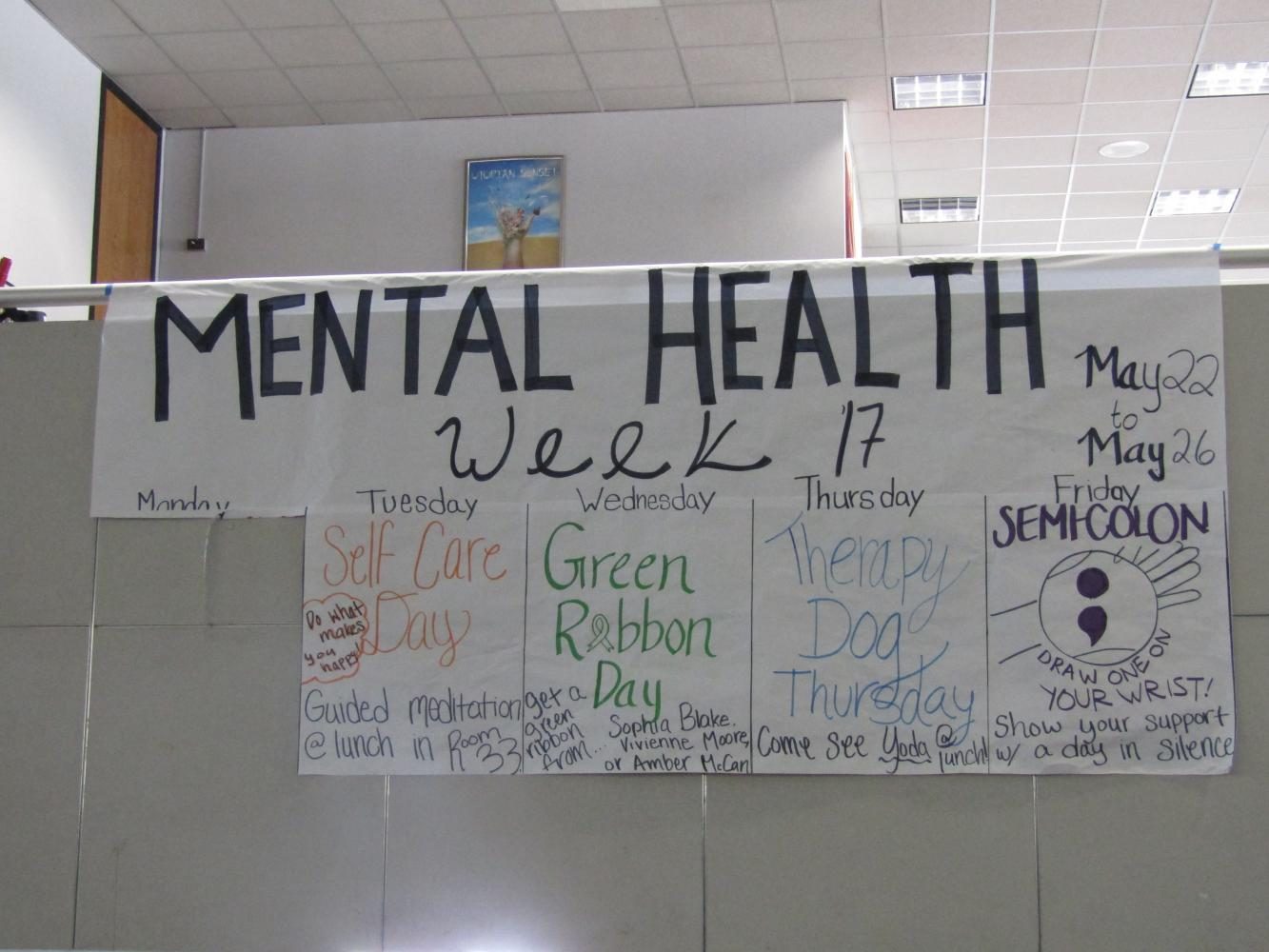Students lead Mental Health Awareness Month
Students recognize the importance of mental illness with a mental health awareness week.
May 30, 2017
In both our classrooms and societies, mental illnesses seem like something forbidden, taboo, an unfortunate ailment to be mentioned only in doctor’s offices and discussed in whispers. Throughout our schooling careers, we are educated on everything from the cells in our body to the mathematics of motion; we are abundantly informed about the various physical dysfunctions one can have: a cold, a broken arm, cancer, and much more; we are taught how and why these disorders occur, who gets them, and how to prevent and treat them. Ask any student what the symptoms of a cold are and they can rattle them off to you by heart. But how often do we discuss or even acknowledge mental illness or health?
Far too little was the answer from a group of students led by Sophia Blake, Amber McCann, and Vivienne Moore. In light of national Mental Health Month, from May 22 to 27, the group organized a Mental Health Awareness week, tackling this stigmatized, taboo topic, and attempting to increase awareness of mental health at Northgate. The week included an informative meeting, a self-care day encouraging the care of one’s own mental health, and concluded with a day in which students wear semi-colons on their wrists in order to show solidarity for those suffering from mental illness.
Senior Sophia Blake shared her insights on mental health and her personal experience with mental illness.
“In 2015, my pediatrician diagnosed me with major depressive disorder and generalized anxiety disorder. More recently, my psychiatrist diagnosed me with Pure-O OCD (purely obsessional obsessive compulsive disorder). It’s been really difficult living with these disorders because they change how I perceive and think about everything,” remarked Blake.
In order to treat her disorders, Blake looks to medication, supplements, DBT (dialectical behavioral therapy), as well as help from her friends as “there’s so little support around it in the public eye”.
Blake explained that even individuals with the same disorder can have vastly different experiences and challenges.
“There are many, many, misconceptions about mental illness,” said Blake. “For specifically OCD, people think it means simply being organized or liking things to be perfectly lined up. For some, it can manifest like that, but for me, it’s so much different. For me it looks like scary images and thoughts running on repeat in my brain, not being able to step on cracks, and being paranoid that people hate me. That doesn’t sound like the typical OCD people know, but it’s real and it’s what I’m going through.”
When asked to explain what her OCD feels like, Blake said, “Imagine the most worrying thought possibly imaginable. Now imagine that thought popping up uncontrollably and without warning. Imagine believing that thought, and that thought taking control of absolutely everything. Imagine doing anything in your power to lower the anxiety of that thought
and then the thought coming back and trying and failing and trying and failing to make it go away. That is the obsessive compulsive cycle. That is OCD.”
Blake also spoke to the intense stigma surrounding mental illness, as well as the common perception that mental illnesses are not as valid or real as physical illnesses. “When I was first realizing I had mental issues, it took me months to snap out of the denial I was in,” reflected Blake. “Even after a diagnosis, I still doubted that I had mental problems. It couldn’t be me. It was so embarrassing and awkward to reach out for help, but I would never feel uncomfortable telling my mom I thought I had a fever or the flu. It just doesn’t make sense.”
Asked about the effectiveness of
education and support of mental illness provided by Northgate, Blake replied candidly, “To be honest, Northgate doesn’t do enough for mental health. A staggering number of students have seriously considered suicide, and that’s not okay. The school needs to be proactive. We can’t wait until a suicide happens to mourn it. We have to make sure it doesn’t get to that point. If anything, I wish that we learned about mental illness in Biology like we do about safe sex and other important topics.”
Blake calls Northgate to action, as so far, students have been the ones primarily responsible for getting treatment and assistance. “Mental health needs to be talked about. The conversation needs to be opened, and Northgate hasn’t been doing it.”

